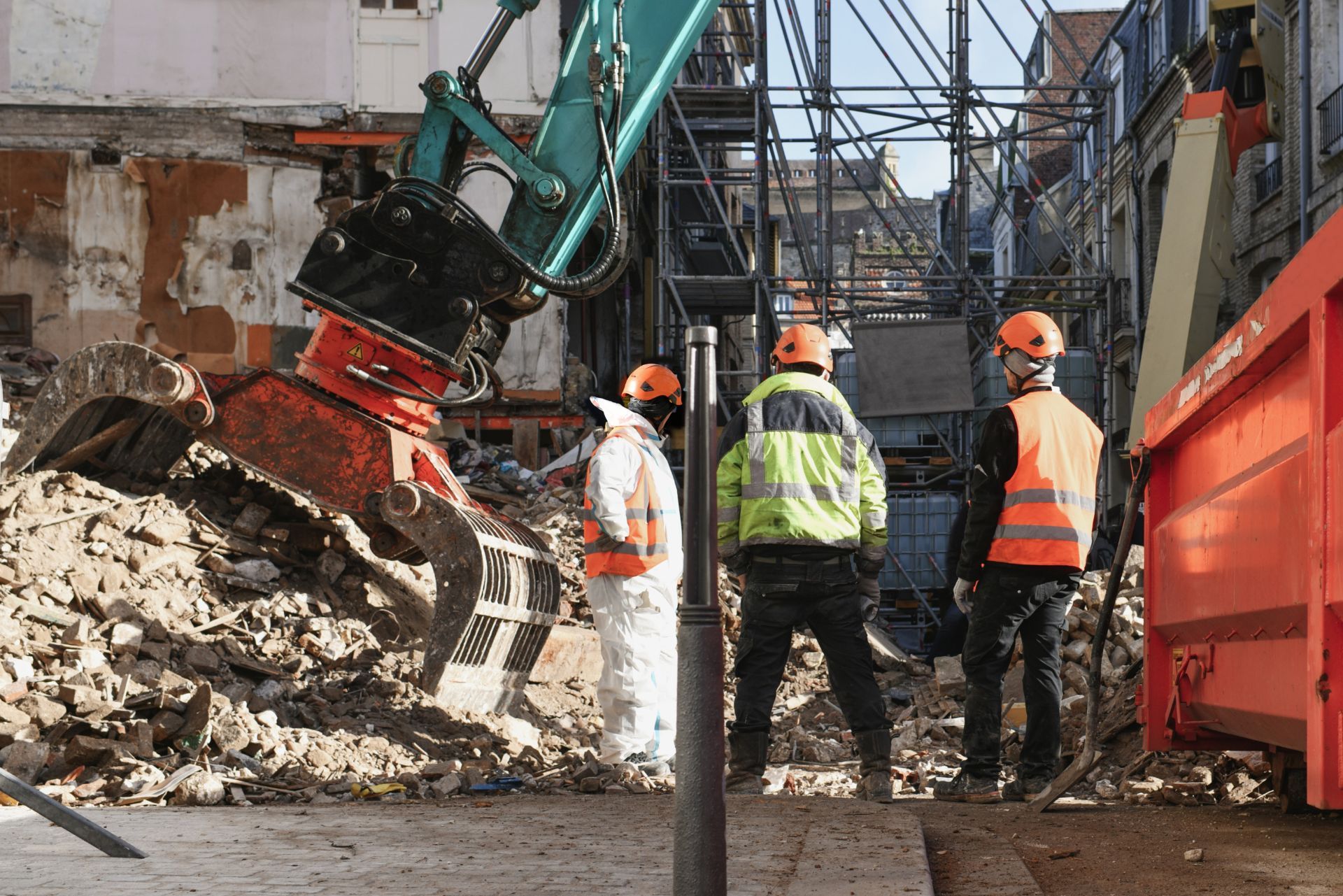Email us today!
Index
Contact Us
Phone
(248) 647-2500
hello@oaklandinsurance.com
Location
8055 Ortonville Rd, City of the Village of Clarkston, MI 48348
Demolition work is a critical part of the construction industry, involving the safe dismantling of buildings and structures. In Michigan, demolition contractors face unique challenges and risks, making insurance an essential component of their business operations. This guide explores the various aspects of
demolition contractors insurance in Michigan, providing insights into coverage options, legal requirements, and tips for selecting the right policy.
Understanding Demolition Contractors Insurance
What is Demolition Contractors Insurance?
Demolition contractors insurance is a specialized form of coverage designed to protect businesses involved in the demolition industry. This type of insurance typically includes a combination of general liability, workers' compensation, and equipment coverage, among others. It safeguards contractors from financial losses due to accidents, property damage, and legal claims arising from their operations.
Given the high-risk nature of demolition work, insurance policies are tailored to address specific hazards such as structural collapses, flying debris, and environmental damage. These policies are crucial for ensuring that contractors can operate without the constant threat of crippling financial liabilities.
In Michigan, demolition contractors must navigate both state and local regulations, which can influence the type and extent of insurance coverage required. Understanding these regulations is vital for compliance and for securing the right insurance policy.
Key Components of Demolition Contractors Insurance
Demolition contractors insurance typically comprises several key components, each addressing different aspects of risk. General liability insurance covers third-party bodily injury and property damage, which are common concerns in demolition projects. This coverage is essential for protecting contractors from lawsuits and claims that can arise from accidents on the job site.
Workers' compensation insurance is another critical component, providing coverage for medical expenses and lost wages for employees injured while performing demolition work. In Michigan, this coverage is mandatory for most employers, ensuring that workers receive the necessary support in the event of an injury.
Equipment coverage is also vital, as demolition projects often involve the use of heavy machinery and specialized tools. This coverage protects against damage or loss of equipment, helping contractors avoid costly replacements or repairs. Additionally, pollution liability insurance may be necessary, particularly for projects involving hazardous materials.

Legal Requirements for Demolition Contractors in Michigan
State Regulations and Licensing
In Michigan, demolition contractors must adhere to specific state regulations and licensing requirements. The Michigan Department of Licensing and Regulatory Affairs (LARA) oversees the licensing process, ensuring that contractors meet the necessary qualifications and standards. Obtaining a license typically involves demonstrating experience, passing examinations, and providing proof of insurance.
Compliance with state regulations is crucial for maintaining a valid license and avoiding legal penalties. Contractors must stay informed about changes in regulations and ensure that their insurance coverage aligns with current requirements. This proactive approach helps mitigate risks and fosters a reputation for reliability and professionalism.
Additionally, local municipalities may have their own regulations and permit requirements for demolition projects. Contractors must navigate these local rules to ensure compliance and avoid project delays or fines. Understanding both state and local requirements is essential for successful operations in Michigan.
Insurance Requirements
Insurance requirements for demolition contractors in Michigan vary depending on the size and scope of the project. However, general liability and workers' compensation insurance are typically mandatory. Contractors must provide proof of insurance when applying for licenses and permits, demonstrating their commitment to safety and financial responsibility.
Beyond the mandatory coverage, contractors should consider additional policies based on their specific needs and the nature of their projects. For example, pollution liability insurance may be necessary for projects involving asbestos or other hazardous materials. Tailoring insurance coverage to meet project-specific risks is a prudent strategy for minimizing potential liabilities.
Contractors should work closely with insurance providers to ensure that their policies meet all legal requirements and provide adequate protection. Regularly reviewing and updating insurance coverage is essential for maintaining compliance and safeguarding business operations.
Choosing the Right Insurance Policy
Assessing Your Business Needs
Choosing the right insurance policy begins with a thorough assessment of your business needs. Demolition contractors should evaluate the types of projects they undertake, the equipment they use, and the specific risks they face. This assessment helps identify the necessary coverage components and ensures that the policy aligns with the business's operational realities.
Contractors should also consider their budget and financial capacity when selecting an insurance policy. While comprehensive coverage is ideal, it must be balanced with affordability. Working with an experienced insurance agent can help contractors navigate these considerations and find a policy that offers optimal protection at a reasonable cost.
Additionally, contractors should assess their risk management practices and safety protocols. Implementing robust safety measures can reduce the likelihood of accidents and claims, potentially lowering insurance premiums. A proactive approach to risk management is beneficial for both safety and financial stability.
Comparing Insurance Providers
Once business needs are assessed, contractors should compare insurance providers to find the best fit. Factors to consider include the provider's reputation, experience in the demolition industry, and customer service quality. Contractors should seek providers with a track record of reliability and responsiveness, ensuring that claims and inquiries are handled efficiently.
Price is another important consideration, but it should not be the sole determining factor. Contractors should evaluate the coverage limits, exclusions, and deductibles of each policy to ensure comprehensive protection. A cheaper policy may not provide adequate coverage, leading to potential financial exposure in the event of a claim.
Contractors should also inquire about additional services offered by insurance providers, such as risk management consultations and safety training. These services can enhance the value of the policy and support contractors in maintaining a safe and compliant operation.

Managing Insurance Claims and Renewals
Handling Insurance Claims
In the event of an incident, managing insurance claims effectively is crucial for minimizing disruptions and financial losses. Contractors should report claims promptly and provide detailed documentation to support their case. This includes photographs, incident reports, and witness statements, which can help expedite the claims process.
Working closely with the insurance provider is essential for ensuring a smooth claims experience. Contractors should maintain open communication with claims adjusters and provide any additional information or clarification as needed. A proactive approach can help resolve claims efficiently and reduce the impact on business operations.
Contractors should also review their claims history regularly and identify any patterns or recurring issues. Addressing these underlying problems can improve safety and reduce the likelihood of future claims, potentially leading to lower insurance premiums over time.
Renewing Your Insurance Policy
Renewing an insurance policy is an opportunity for contractors to reassess their coverage needs and make necessary adjustments. Contractors should review their business operations, project types, and risk exposures to determine if their current policy remains adequate. Changes in business size, scope, or location may necessitate updates to the policy.
Contractors should also evaluate their insurance provider's performance and consider whether a change is warranted. If service quality or coverage options have declined, exploring alternative providers may be beneficial. However, contractors should weigh the benefits of continuity against the potential advantages of switching providers.
Finally, contractors should negotiate renewal terms with their insurance provider, seeking opportunities for premium reductions or enhanced coverage. Demonstrating a commitment to safety and risk management can strengthen the contractor's position during negotiations and lead to more favorable terms.
Conclusion
Demolition contractors insurance is a vital component of operating a successful and compliant business in Michigan. By understanding the key components of insurance coverage, legal requirements, and best practices for selecting and managing policies, contractors can protect themselves from financial risks and ensure the safety of their operations. A proactive approach to insurance and risk management not only safeguards the business but also enhances its reputation and competitiveness in the industry.
REQUEST A QUOTE
Speak with a demolition contractors insurance specialist today!
Get started today!
Prefer to speak with an agent now?







